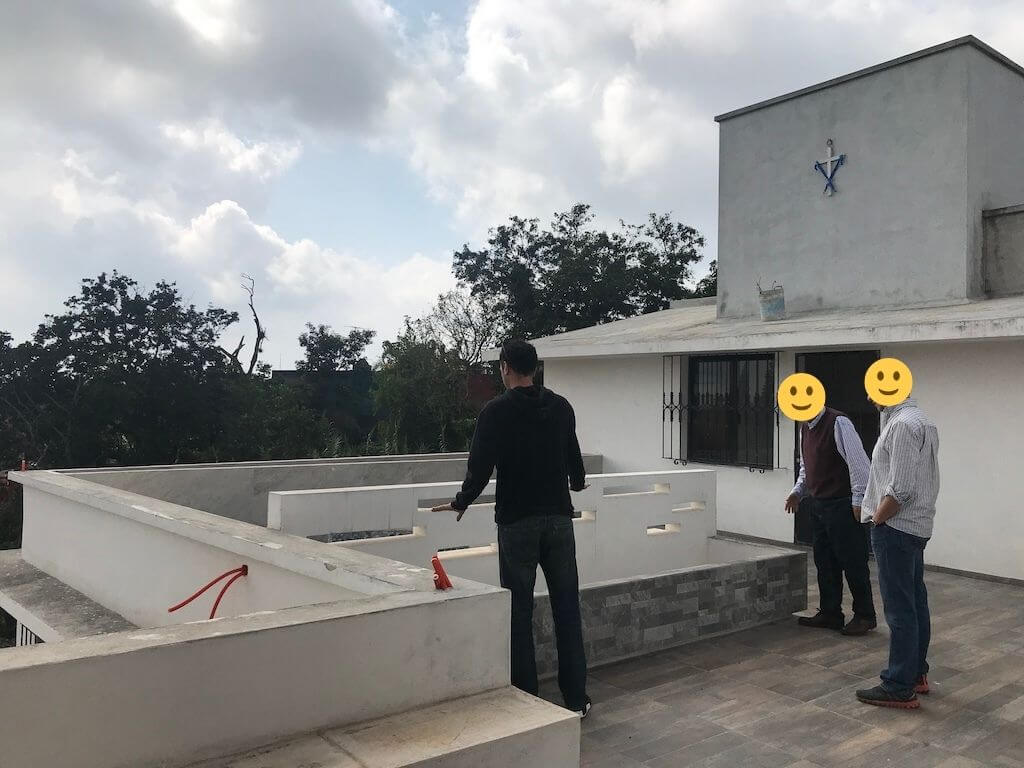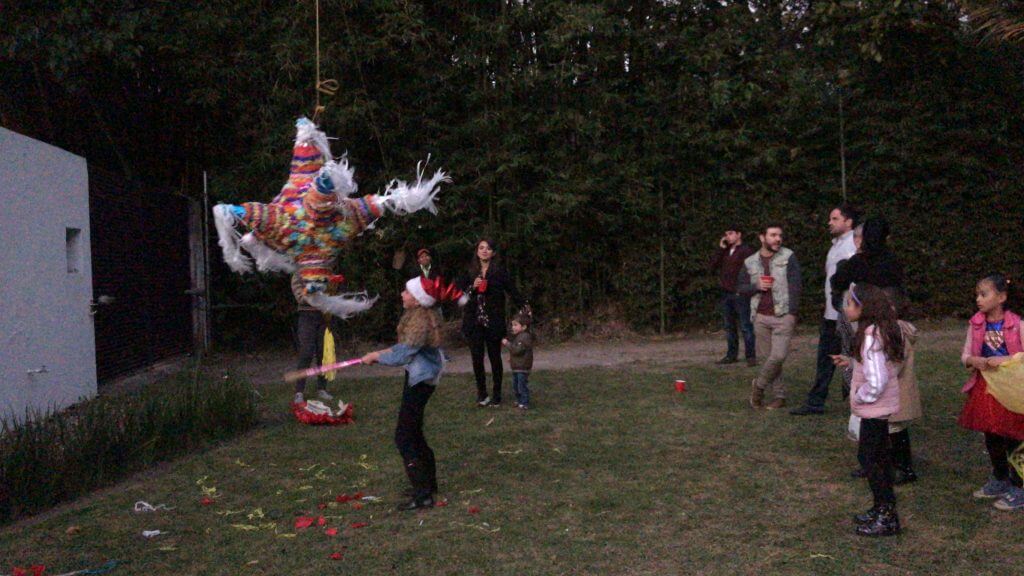30 Fascinating Mexican Holidays & Traditions to Experience in 2024
This post may contain affiliate links. Read my Disclosure & Privacy policies for more detail.
Wondering what some of the most commonly celebrated Mexican holidays and traditions are? Learn about some of Mexico’s liveliest festivities and how they’re celebrated.
If there’s one thing I’ve learned while spending years living in Mexico, it’s that there are a LOT of holidays and traditions, and people here are NOT shy about celebrating them.
This is one of the things that I love about Mexico as an extranjera. Though I won’t lie, it did take some getting used to.
When I first arrived in Mexico, I seemed to fall asleep frequently to the sounds of firecrackers, pulsing music, and other indicators of a party.
Initially, I just assumed I lived in a lively neighborhood, but local friends soon informed me that the neighbors were just celebrating one festive day or another.
Whether it be Dia de la Albañil (celebrating construction workers), Dia del Maestro (celebrating teachers), or a fiesta patronal (a day celebrating a particular saint), there ALWAYS seems to be something to celebrate in Mexico.
Below I’ll highlight some of the most prominent national holidays in Mexico, as well as some cool festivals and celebrations that happen throughout the year.

Traveling soon? Don’t forget to buy travel insurance for Mexico. Insurance gives you peace of mind, knowing you can get the help you need if anything goes wrong. SafetyWing is the provider that I recommend.
While many of Mexico’s holidays probably aren’t of interest to travelers, there are quite a few that are. Participating in these events is a wonderful way to learn about Mexican culture.
But, even if you don’t participate, you might be curious about what everyone around you is up to during some of these holidays.
You probably already know of some, such as Dia de Muertos, but trust me, that’s just the beginning.

The following list is by no means exhaustive, but I wanted to share some of the traditions that travelers may notice or be interested in while visiting Mexico. I’ve included them in chronological order, so you can scroll through the list to locate the holidays corresponding to when you’ll be in Mexico.
Throughout my time living in Mexico, I experienced most of these events in one way or another, but the true meaning of each one wasn’t necessarily clear to me at the time. I still have a lot to learn.
Again, most of what I’ve covered here are holidays and traditions, but I’ve also included a few major festivals you may be interested in attending.
Who knows, maybe you’ll be planning your next Mexico bucket list adventure around one of these events!
Mexican Holidays and Traditions to Experience

1. Año Nuevo (New Year’s Eve) – Dec 31st – January 1st
As you might expect, New Year’s Eve is often celebrated with a big party. But, in addition to the food, music, dancing, and fireworks that typically accompany this holiday, Mexicans have some fun and unique New Year’s Eve traditions of their own.
You may notice packages (or even giant bins) of yellow and red underwear for sale in grocery stores or tianguis markets throughout Mexico in the days leading up to the new year.
This is because wearing a particular color of underwear on New Year’s Eve is a way to set your intentions for the year ahead. Those who wish to find love in the New Year wear red underwear, and those who want to attract money don yellow undies.
If you plan to travel in the New Year, grab an empty suitcase and run around the block with it at midnight. This is said to bring luck to your travels.
Another quirky New Year’s Eve tradition in Mexico is to eat 12 grapes during the one-minute countdown to midnight, making one wish for each grape. This ritual is said to bring luck throughout the year.
But beyond these rituals, New Year’s Eve is typically a big party. Many people gather with friends or family and have parties at home, but plenty of Mexicans head to bars, nightclubs, and other events (such as fireworks displays or concerts).
Where to spend New Year’s in Mexico:
There isn’t a bad place to be in Mexico on New Year’s Eve. Of course, cities and tourist destinations are bound to have the biggest festivities, but you’ll be able to find celebrations almost anywhere.
If you find yourself in Mexico City on New Year’s Eve, you’ll have no shortage of things to do.
There are typically concerts and events held throughout the day in Mexico City’s historic center, culminating in a large concert in the Zócalo as the night draws to a close.
Restaurants, bars, and nightclubs will all have festivities as well– but plan ahead and make a reservation if you’re hoping to join in.
Mexico’s tourist destinations typically host parties, concerts, and fireworks shows, too. Again, you should plan to make reservations for any events you hope to attend.

2. Día de Reyes (Three Kings Day) – January 6th
Día de Reyes, also known as Día de Los Reyes Magos or Día de Los Santos Reyes, is celebrated on January 6th.
The tradition on this day is to eat a piece of the Rosca de Reyes, a delicious, ring-shaped sweet bread (similar to a hot crossed bun) with one or a few plastic figurines in the shape of a child embedded inside.
If your slice of Rosca contains one of the figurines (called a muñequito, or little doll) or it shows up when you cut it, you have to serve everyone at the gathering tamales on February 2nd for Día de la Candelaria.
For some children in Mexico, the Three Wise Men stop by their houses and leave some gifts on Dia de Reyes, kind of like Santa Claus, but on the night of January 5th.
In the weeks leading up to Día de Reyes, you will probably notice all the supermarkets and bakeries selling the Rosca de Reyes bread.
Even if you’re not participating in the holiday, I highly recommend tasting this delicious sweet bread. And hey, if you do happen to find a muñequito in there, treat yourself to some tamales on February 2nd– it’s tradition, after all!
Some Roscas are better than others, so try to find one from a local bakery rather than a supermarket for the ultimate experience.
Día de Reyes also kind of marks the end of the Christmas season in Mexico. Many families will leave their Christmas trees up until January 6th.

3. Día de la Candelaria (Candlemas) – February 2nd
Dia de la Candelaria is a Catholic holiday in Mexico that is associated with a feast to honor the purification of the Virgin Mary and the presentation of the baby Jesus at the Temple.
One of the traditions associated with Día de la Candelaria is to dress up a figure of Jesus Christ in a special outfit and take it to the church to be blessed.
But, for families that aren’t particularly religious, the main purpose of this holiday nowadays is to eat tamales.
Remember the Rosca de Reyes from January 6th? Whoever cut into the muñeca on that day is responsible for providing the tamale feast on February 2nd.
If you aren’t lucky enough to have anyone owe you a tamale feast, you’ll have no problem sourcing tamales on your own leading up to February 2nd. You’ll see them advertised at market stalls, sold on the street en masse, or featured on restaurant menus at this time of year.

4. Día de la Constitución (Constitution Day) – February 5th
Constitution Day commemorates the signing of Mexico’s constitution in 1917, which ended el Porfiriato– the dictatorial reign of President Porfirio Diaz.
While February 5th is the official date that the constitution was signed, the holiday is now celebrated on the nearest Monday to the official date.
Schools, offices, and most businesses close on Dia de la Constitución, and there are tons of festivities throughout the country.
There are usually parades and live performances with dancing, music, good food, and more!
And, since the holiday falls on a Monday, many people take advantage of the long weekend to take a weekend getaway or host a gathering with friends.
If you find yourself in Mexico around February 5th, you’re bound to catch a glimpse of the festivities.

5. Día de la Bandera (Flag Day) – Feburary 24th
President Lázaro Cárdenas established Día de la Bandera in the 1930s to honor the Mexican flag.
The three-color design of Mexico’s flag was first implemented in 1821 when the country gained independence from Spain.
The color red represents unity between the indigenous population and those with European blood, the white represents the purity of Roman Catholicism, and the green represents Mexico’s independence.
The image of the Eagle perched on a cactus with the snake in its talons was added in the 1960s and is loosely based on an Aztec legend that the city of Tenochtitlán was to be established wherever settlers saw an eagle perched on a cactus.
Día de la Bandera is an important day to celebrate national pride. It’s a bank and school holiday and is typically celebrated with a military parade. In Mexico City, the president typically hosts a flag-raising ceremony in the Zócalo.
If you find yourself in Mexico on February 24th, you’re bound to encounter some form of celebration in the downtown core of any city in the country.
6. Día de Benito Juarez (Benito Juarez Day) – March 18th, 2024
Benito Juarez was the first indigenous president of Mexico and held office from January 1858 to July 1872. He is widely considered a national hero for his liberal and reformist politics and for leading Mexico through two civil wars, the Guerra de Reforma (War of the Reform) and the Segunda Intervención Francesa en México (French Intervention).
Día de Benito Juarez is a national public holiday that celebrates his birthday. Juarez was born on March 21st but the holiday takes place each year on the third Monday of March each year.
Schools are offices are closed on this day, and towns across the country usually hold some sort of event to celebrate Benito Juarez’s legacy. Cities will often hold parades, fireworks shows, and performances in the zócalo or the main street. It’s sure to be a festive time!

7. Semana Santa & Pascua (Easter) – March 24 – 30, 2024
Holy Week, or Semana Santa, is a Catholic holiday based around Easter, or Pascua, as it is known in Spanish. Semana Santa begins on Palm Sunday, and, for some, it extends for another week following Easter Sunday.
Since the holiday is based around Easter, many religious celebrations occur during these days. However, for many people, the focus of Semana Santa is the fact that they get a long holiday from work.
Students and school staff usually get two weeks off while other workers receive a puente, or long weekend.
If you happen to be in Mexico around Semana Santa (or are planning on going), I recommend avoiding touristy destinations, especially beach towns, because they will be extraordinarily crowded.
Since Semana Santa is the first vacation for locals after Christmas and they flock to the coast to soak up the sun. If you don’t mind crowds, by all means, head to the beach, as the mood will be jovial, but rates will be high.
To beat the crowds, head to the cities. Places like Mexico City and Guadalajara are wonderful around Semana Santa, as they are less busy than usual.
8. Día del Niño (Children’s Day) – April 30th, 2024
If you find yourself in Mexico on April 30th, you’re in for a treat! This day is Día del Niño, a vibrant celebration dedicated to the joys of childhood.
Día del Niño puts children at the forefront. Schools across Mexico transform into playgrounds for the day; forget about regular classes, as they’re replaced with a whirlwind of fun activities such as piñatas and games.
But the fun isn’t confined to schools! Communities come alive with events catered to youngsters, from puppet shows and magic acts in the parks to museum exhibitions and even themed fairs!
If you’re traveling in Mexico on this day, you may notice these festivities taking place around you.
9. Dia del Trabajo (Labor Day) – May 1
Mexico’s Labor Day is a day devoted to honoring worker’s unions. This is a holiday for organizations like banks and government offices, but retail locations typically stay open.
There usually aren’t any major festivities around Labor Day, but you may notice that more things are closed around town than usual– this is why!
You can also expect bars, restaurants, and other attractions to be more crowded as those celebrating Dia del Trabajo will be out having fun instead of being stuck at the office!

10. Día de Albañil (Construction Worker’s Day) – May 3rd
Día de Albañil, also known as the Día de la Santa Cruz, is a day in tribute of hardworking construction workers. It is held on May 3rd each year.
The day isn’t celebrated with a grand parade, but rather simple gestures of appreciation.
Typically, the owner of a property under construction (or, on larger projects, the contractor) treats the construction crew to a delicious lunch as a gesture of appreciation for their hard work.
Another key part of Día de Albañil is hanging a wooden crucifix at the construction site. This is meant to bless the work and offer protection to the workers.
When I was living in Xalapa, a friend’s parents were having a home built and I joined them in treating their construction team to a tasty taco feast for Día de Albañil. We brought tacos and beer to the site and hung out, chatting and swapping stories.
After lunch we hung a cross on the side of the building!
While Día de Albañil might not be a holiday you actively seek out as a traveler, I thought it was an interesting and thoughtful tradition. Now you’ll know what it means if you see crucifixes hanging on partially constructed buildings!

11. Cinco de Mayo – May 5th
Cinco de Mayo isn’t actually widely celebrated in Mexico, but I wanted to include it on this list because the day IS significant, but likely not in the way you think.
Firstly, it is NOT Mexico’s Independence Day – scroll down to September 15th for more info on that holiday (it’s a big one!).
Cinco de Mayo commemorates the Batalla de Puebla (aka The Battle of Puebla) when a small contingent of the Mexican army defeated a much larger army of French troops as they tried to capture the town of Puebla in Puebla State.
Despite the poor odds, the Mexican army was victorious! This day is celebrated in Puebla City with a military parade, music, food, and dancing, but nowhere else in Mexico.
Cinco de Mayo is celebrated much more widely in the US, where restaurants and liquor companies have succeeded in capitalizing on it as an excuse to sell Mexican food, beer, and margaritas.
But before it became a commercial holiday in the US, Cinco de Mayo held significance for US citizens of Mexican descent. According to period newspapers, Cinco de Mayo celebrations have been taking place in Los Angeles and other western states in the US since shortly after the Battle of Puebla.
In recent years, the holiday has become a symbol of cultural pride for Mexican Americans, with celebrations taking place each year in cities across the United States, including Los Angeles, San Francisco, San Diego, and Phoenix.

12. Dia de la Madre (Mother’s Day) – May 10th, 2024
In Mexico, Mother’s Day is celebrated on May 10th. Mexican culture is very family-oriented, and when it comes to celebrating one of their own, they go all out.
If you happen to be in Mexico during Mother’s Day, you can expect serenades starting at midnight, some even with mariachi bands.
During the day, Mexican families usually take their matriarch out for a nice lunch, give her all kinds of gifts, and pamper her as much as possible.
13. Día del Maestro y la Maestra (Teacher’s Day) – May 15th, 2024
Día del Maestro y la Maestra is a day dedicated to honoring the nation’s educators. Dating back to 1917, this day is not a public holiday, but its significance is felt deeply in schools across the country.
Students often present their teachers with small handmade gifts or cards to show their appreciation for them. And while classes are not canceled on this day, teachers are usually treated to a day of festive events in the school. Students may perform skits, sing songs, or recite poems to show gratitude to their teachers.
And it’s not just within the school walls; families also join in the celebration. They take the time to honor their family members who are educators, recognizing their role in shaping young minds.
14. Día del Padre (Father’s Day) – June 16th, 2024
On the third Sunday in June, Mexico celebrates Día del Padre, a day dedicated to honoring fathers.
Across the country, it’s a time for families to express their love and appreciation for their patriarchs. The celebration typically involves giving gifts to dads and treating them to a special meal.
Whether it’s a home-cooked favorite or dining out, the focus is on spending quality time together. It’s a great excuse for the entire family to gather and enjoy a nice meal together.

15. Día de la Independencia (Independence Day) – September 15th & 16th
Contrary to what many extranjeros believe, Mexican Independence Day does NOT fall on May 5th. Independence Day celebrations begin the night of September 15th and continue the next day.
Although technically, Mexico achieved independence on September 21st, 11 years after the main battle started, Mexico celebrates the day the movement originally began.
This day is known as El Grito de Dolores, or simply El Grito, and it is one of the most important Mexican holidays. And one of the most widely celebrated.
On September 15th, 1810, Miguel Hidalgo started the independence movement in the town of Dolores (now called Dolores-Hidalgo) in Guanajuato. From there, he and his army marched south to the capital to face the Spanish conquerors.
El Grito is a major event everywhere in the country, full of pride, color, and joy. Festivities begin at 11 pm on September 15th.
At this time, all of the representatives of the main government in each state and city, along with the President, stand out on their correspondent office’s balcony, which opens to the city or town’s main square where typically there is a crowd gathered.
They make a speech commemorating their national heroes and finish with el Grito: Viva México! This is followed by fireworks, dinner, and a long night of celebration.

How to participate in Mexican Independence Day?
On the night of el Grito, it’s standard to find celebrations pretty much anywhere in Mexico.
I recommend going to a Mexican restaurant where you can indulge in the best traditional dishes, accompanied by mariachi, ranchero, or bolero music. You are in for a night of tequila and good spirits!
Another way to participate in the celebration is to visit a city’s zócalo. In most places, there will be fireworks, concerts, or some type of performance. If you choose to do this, exercise extreme caution, as pickpockets typically look for a payday during events like this.
In most of the towns and cities of Mexico, September 15th is considered a noche libre, meaning citizens can drink publicly without consequences (though nothing is guaranteed).
As with any alcohol-fuelled event, be cautious because it’s not uncommon for a few people to become out of control.
Where to celebrate Independence Day in Mexico?
To be honest, I’d say anywhere in Mexico will be really fun around those dates.
Regardless, it depends on what you are looking to experience. If you simply want to take part in the festive mood, anywhere will suffice.
If you’re looking to party, larger cities are likely your best bet, as they typically offer free concerts and events. There’s usually a free performance by a well-known Mexican artist in Mexico City’s Zócalo on this day.
Dreaming of experiencing Dia de la Independencia in Mexico City? Base yourself in one of these gorgeous vacation rentals!

16. Dia de Muertos – October 31 – Nov 2
Dia de Muertos, or Day of the Dead as we know it in English, is a holiday dating back to pre-Columbian times that celebrates the lives of our departed loved ones.
It is now probably one of the most well-known Mexican holidays by extranjeros, thanks in part to the film Coco!
Each year in late October, families build altars, or ofrendas, to honor loved ones who have passed away.
They adorn the altars with flowers, papel picado, candles, and photos of the people they wish to remember. Many people also place the favorite foods and other items their loved ones cherished on the altar. There are many symbols and motifs that are associated with Day of the Dead, each with its own special meaning.
Some families like to decorate the tomb of their departed family members and will even sit in the cemetery on the Dia de Muertos and share a meal with them.
It is said that on these days, the souls of the dead return to earth to share time with their living family members.
Because this holiday has increased in popularity in recent years due to attention in the media, it’s common for businesses and organizations to create ofrendas as well. Though they may not be dedicated to anyone in particular, these altars are often creative and artistic.
Pan de muerto is a traditional food that you’ll see everywhere during Día de Muertos. It’s a sweet bread decorated with a sugar pattern that is meant to represent bones. It’s a delicious treat, and it pairs wonderfully with a mug of chocolate caliente. You’ll be able to find it at pretty much any bakery during the month of October.

How to participate in Dia de Muertos:
There’s no question that the Day of the Dead is a beautiful tradition, and it’s natural to want to be part of it. However, it is a very personal holiday, so it’s important to participate respectfully.
That said, many towns in Mexico have Day of the Dead festivities geared toward the public. This makes it easy to appreciate the festivities without encroaching on anyone’s intimate celebration.
There are often parades, public ofrendas, and even art exhibitions in honor of the holiday.
Where to experience Dia de Muertos in Mexico:
Day of the Dead is celebrated throughout Mexico, but some places have more elaborate festivities than others. Mexico City is known for its huge Day of the Dead parade along Avenida Reforma in the Centro Historico.
The cities of Oaxaca, Merida, and Guanajuato are known for hosting many public events and art exhibitions in the days surrounding the holiday. These cities are also known for having gorgeous, festive decorations throughout the city streets.
Regardless of where you are in Mexico during Dia de Muertos, you’re sure to experience some sort of celebration. Don’t feel that you’ll miss out if you don’t make it to one of the locations mentioned above!
Related Reading: Visiting Mexico in November? Check out these tips before your trip!

17. Día de la Revolución – November 20th
Día de la Revolución celebrates the start of the Mexican Revolution. On November 20, 1910, Francisco Madero started the movement to end Porfirio Diaz’s 35-year dictatorship over Mexico. The Revolution ended on February 5, 1917.
What started as a movement to end an autocratic leader turned into a civil war and became one of the most important historical events in Mexico.
The Mexican Revolution is celebrated on November 20th. On that day, there are no classes, and for most people, it’s a day off from work.
Usually, there are parades all over the country showing a display of Mexico’s students, teachers, local athletes, and military members.
Have you ever noticed that every city in Mexico seems to have a street called 20 de Noviembre? That’s in honor of this day!
18. Día del Músico (Musician’s Day) – November 22nd
On November 22nd, Mexico celebrates Día del Músico, also known as the Day of Santa Cecilia, after the Patron Saint of Musicians. This day is dedicated to honoring and celebrating musicians throughout the country.
Arts communities across Mexico mark the occasion with special concerts and musical events. In families where members are musicians, it’s common to do something special to celebrate these individuals on this day.
For travelers, Día del Músico is an opportunity to experience the rich musical heritage of Mexico, as the country comes alive with music in honor of those who create it.

19. Día de la Virgen de Guadalupe (Virgin of Guadalupe Day) – December 12th
The Virgen de Guadalupe is one of the most important religious symbols in Mexico. Some people even say they don’t believe in most of the orthodox version of Catholic history, yet they are devoted to her.
There is a special branch of Catholicism in Mexico named “Guadalupanos,” and the Virgen de Guadalupe serves as the idol and symbol for most of them.
Legend says that on December 12th, the Virgin appeared to a man named Juan Diego.
She ordered him to start the process of building her a temple, and as proof to the clergy, he brought an ayate (a piece of fabric made of maguey plants) with flowers that had her image
woven into it.
Though initially skeptical, the bishop finally saw the Virgin appear and deemed that it was indeed necessary to build a church on that spot as she requested.
Mexicans celebrate her day by holding a big mass in La Basílica de Guadalupe, which is built on Tepeyac Hill in Mexico City.
Each year, millions of people travel from all around the country to attend the mass at the Basilica de Guadalupe. Some of them travel thousands of miles on foot, and others arrive by bike or in cars and buses.
In the days leading up to December 12th, it’s common to see caravans of people traveling in the direction of Mexico City for the mass.
They decorate their vehicles (whatever they may be) with balloons, lights, and crosses, and toot horns or blast music as they make the journey.
Día de la Virgen de Guadalupe kicks off the Christmas season in Mexico, which runs from December 12th to January 6th. This period of time is often referred to as the Guadalupe-Reyes season.
How to participate in the Día de la Virgen de Guadalupe in Mexico:
There are three main ways to participate. The first would be to go to the Basílica de Guadalupe to pay your respects.
There you can experience the enormous mass along with millions of others (in 2018, there were said to be over 10 million attendees). There will surely be mariachi bands and even appearances by major Mexican celebrities.
If you’re feeling adventurous, you could join a caravan and travel thousands of miles.
Alternatively, you can just cheer them along as they pass, giving them momentum to complete the journey.
Where to experience Día de la Virgen de Guadalupe in Mexico?
The main place to experience this holiday is at the Basílica de Guadalupe in Mexico City. However, I don’t recommend attending unless you are highly devoted to the cause or simply love large crowds.
Of course, the day is also celebrated in every place in Mexico that has a Catholic church. Wherever you are, expect to see lots of people in the streets!
Curious to learn more about the Virgen de Guadalupe? You can tour Mexico City’s Basilica anytime throughout the year! This half-day tour will educate you on the origin of the Virgin and her cultural significance as you check out the incredible Basilica with a guide.
20. Guadalupe – Reyes – December 12 – January 6th
Guadalupe-Reyes is a modern Mexican tradition related to the Christmas season. The holiday season kicks off on December 12th with Día del Virgen de Guadalupe and ends on January 6th with Día de los Reyes Magos.
This long stretch of eating, drinking, and merrymaking between these two festive bookends is known as the Maratón de Guadalupe-Reyes (Guadalupe-Reyes Marathon).
It’s just a fun way to refer to the indulgent holiday season. Now that you’re aware of it, you’ll probably notice memes about it and references to it during the Christmas season.
Have fun!

21. Las Posadas – December 16th to 24th
Las Posadas is a tradition that carries on over the days leading up to Christmas in Mexico. This tradition is based on the story of Mary and Joseph seeking shelter for the baby Jesus to be born.
In the days leading up to Christmas, people get together to pedir posada (ask for shelter). This involves singing traditional verses and songs.
After everyone finishes singing the verses, the gathering becomes a typical holiday party. There is generally lots of food, drinking, and even piñatas!
Posadas are a great excuse to indulge in copious amounts of traditional Mexican food and drinks, like the delicious ponche, a cider-like beverage made from stewed fruit that is traditionally made around Christmas time.
Posadas are held throughout Mexico starting on December 13th, and the last posada is traditionally Christmas Eve.
Where to experience posadas in Mexico:
Posadas are held throughout Mexico. In small towns (pueblos), these events are sometimes more traditional, where a group of people will walk through town and sing the posada verses at the homes of strangers (kind of like caroling back home).
On the other hand, in cities, a posada is often just a normal holiday party with a brief singing segment.
Just in case you’re concerned about not knowing the words to the posada verses, don’t be! I’ve linked them here. Plus, many posada hosts will print them out so you can read them as you sing.

22. Nochebuena (Christmas Eve) – December 24th
Unlike in the US and Canada, where Christmas Day is the focus of the festivities, in Mexico, these fall on Nochebuena (Christmas Eve). The day is usually spent with family, gathered around the Christmas tree, eating, drinking, and being merry!
Some families attend Christmas Eve mass together before regrouping at home to eat and share gifts.
Sometimes families will perform pastorelas for one another. These are short Christmas-themed plays. Often you can see pastorelas performed publicly in the weeks leading up to Christmas, but families will put them on at home for fun, too!
Mealtime generally begins at midnight and is followed by opening presents. Turkey is a popular Christmas Eve dinner in Mexico, but may not be prepared the way you are used to back home.
My Mexican family always did a tequila-adobo turkey which was exquisite!
Bacalao is a very common Christmas Eve menu item too. It’s a delicious fish stew made with cod, tomatoes, onions, chiles, green olives, and more. If you’ve ever had pescado a la veracruzana, it’s similar to that, but a stew version!

23. La Navidad (Christmas Day) – December 25th
After the late-night festivities on Christmas Eve, Christmas Day is typically spent lounging around with the family, eating, and watching the children play with all their new presents. Some families may attend mass together again.
Christmas Dinner is typically a recalentada (reheated leftovers), and the day is typically very low-key. At least in my experience.
24. Día de Los Santos Inocentes (Day of the Holy Innocents) – December 28th
Dia de los Santos Inocentes is kind of like Mexico’s version of April Fool’s Day. The origin of the tradition is grim, but it’s now seen as an excuse to pull pranks and have fun.
While the tradition is typically honored in the form of practical jokes among family and friends, there is often some sort of public observance too.
Sometimes newspapers will publish outlandish and untrue headlines in the name of being playful.
Mexican Festivals to Attend
The following are some of the largest or more widespread festivals and events to attend in Mexico each year. This list is by no means exhaustive. There are tons of regional events like state fairs, and localized cultural events, plus tons of things that happen at a city level.
Check the tourism page for your next Mexico travel destination to learn about any events that are taking place during your visit!

25. Carnival in Mexico – Ash Wednesday to Lent – Feb 8 – 13, 2024
Carnival takes place each year from Ash Wednesday through to the start of Lent, which usually falls between February and March.
This festival was brought to Mexico by the Spanish, but the indigenous communities embraced it because it overlapped with some festivities of their own. Today’s Carnival celebrations incorporate lots of nods to Mexico’s indigenous cultures.
The festivities associated with Carnival involve parades, musical events, dancing, and elaborate costumes. It’s a lively and vibrant event to experience and draws enormous crowds.
Where to experience Carnival in Mexico:
Carnival is celebrated throughout Mexico, but the two main cities to experience it are Mazatlan and Veracruz. Other prominent celebrations take place in Cozumel, Merida, and Campeche City.
In the Baja Peninsula, you can find Carnival celebrations in Ensenada and La Paz.
If you plan to participate in Carnival, use common sense– with huge crowds and free-flowing alcohol, it’s vital to be mindful of your safety.
26. Festival Vive Latino – March 16th – 17th, 2024
The Festival Vive Latino is a music festival that has been held in Mexico City since 1998. It takes place each year in the city’s Foro Sol Stadium and features a rotating lineup of artists from throughout Mexico and beyond.
The 2024 lineup includes Maná, Mexican Institute of Sound, Belanova, Jorge Drexler, Los Lobos, Paramore, Portugal. the Man, and many more.

27. Traviesa Sagrada Maya (Sacrad Maya Crossing) – May 17-18th, 2024
The Travesía Sagrada Maya, held each May, is a 500-year-old tradition where pre-Columbian people would paddle from the Riviera Maya to Cozumel Island to honor the goddess Ixchel.
Participants carry offerings in their canoes to exchange for a sacred message from the goddess. After receiving this message, they return to the mainland to share it with the villagers.
The Traviesa Maya still takes place each year. And while rich in cultural significance, it has also become a display of athleticism.
Travelers can witness this tradition by joining onlookers on the shores outside of Playa del Carmen, cheering on the paddlers as they undertake this meaningful journey. It’s a unique opportunity to see a centuries-old tradition that continues to be an important part of the region’s cultural heritage.

28. Guelaguetza Festival – July 22nd & 29, 2024
La Guelaguetza is an event that takes place in Oaxaca City every July on the two Mondays following July 16th. The festivities take place on the Cerro de Fortín, as they have since pre-Columbian times.
Due to its timing and location, the festival is also referred to as Los Lunes del Cerro, which translates to “Mondays on the hill.”
On these dates, indigenous groups from throughout the state arrive in the capital city to put on a festival highlighting regional music, dance performances, textiles, crafts, and food specialties.
The celebration includes parades as well as stage performances, offering attendees plenty of opportunities to participate!
One of my favorite travel vloggers, Alan X El Mundo, shares a peek at what it’s like to attend La Guelaguetza!
How to participate:
The best way to participate in La Guelaguetza is to purchase tickets to the performances. Visit the event’s Facebook page for up-to-date information on how to do so!
Where to be:
La Guelaguetza takes place in Oaxaca City, Oaxaca, each year in July. The dates of the event change each year, but it takes place on the two Mondays following July 16th unless one of them happens to land on Benito Juarez Day, in which case the festival is pushed back one week.
This festival is really popular, so if you plan to attend, book accommodation well in advance!

29. La Noche Que Nadie Duerme – August 14, 2024
La Noche Que Nadie Duermo (The Night Nobody Sleeps) is an event that takes place each year during the Fería de Huamantla (Huamantla Fair) in the city of Huamantla, Tlaxcala.
Why doesn’t anyone sleep, you ask?
Because they’re busy!
On the evening of August 14th, folks gather to create ornate tapetes (carpets) made from colorful sawdust. These tapetes are spread through the main streets of the town, meaning nobody is permitted to walk on them until after this portion of the event.
Naturally, it takes a great deal of time to create elaborate, colorful street art using colored sawdust! Once the designs are completed, they stay in place for several hours so visitors to the fair have a chance to admire them.
And then, at 1 A.M. on August 15th, a procession for la Virgen de la Caridad (Our Lady of Charity) begins, and folks take to the streets overtop of the stunning tapetes.
The Fería de Huamantal is a two-week event that takes place each year, but the Night that Nobody Sleeps is one of the highlights of the festivities. If you happen to be near Huamantla during August, it would be a really unique thing to see!

30. Festival Internacional Cervantino – October 11 – 27, 2024
The Festival Internacional Cervantino (aka, Cervantino) is an arts festival that takes place in Guanajuato City, Guanajuato, for three weeks each October.
What began as a festival featuring performances of short plays written by Miguel de Cervantes (you recognize him as the author of Don Quixote) has evolved into the biggest arts festival in all of Latin America.
For three weeks every October, visitors from all over Mexico and the world arrive in Guanajuato to take part in the festivities.
Check out the Ballet Folklórico from the University of Oaxaca performing at Cervantino a few years ago:
Each year Cervantino honors the art and culture of one country in the world and one of Mexico’s states. The 2019 festival highlighted Canada and the state of Guerrero, Mexico.
Throughout the three weeks of festivities, attendees attend theatre and musical performances and art exhibitions.
I haven’t attended Cervantino, but from what I’ve been told, Guanajuato’s narrow streets are literally bursting with art during the festival.
The events and exhibitions occur in various venues throughout the city, so everywhere you go, there is some form of art, music, or performance to witness.
How to participate:
Cervantino consists of many events and exhibitions. Make the most of it by purchasing tickets to the presentations that most interest you. If you’re on a tight budget, have no fear because there are also plenty of free events and performances that you can attend!
Where to be:
Cervantino takes place in Guanajuato City, Guanajuato. The city is relatively small (under 200,000 people), and the festival is very popular. If you plan to attend, be sure to reserve accommodation in advance.
Visit the official Cervantino site for info on this year’s festival!
How to Be a Respectful Participant in Mexican Holidays and Traditions
These Mexican celebrations are all fun and alluring, even to visitors from other countries, but it’s important to participate respectfully.
For Mexicans, many of these traditions are quite personal (especially the religious ones). It’s important that you don’t make anyone feel that you’re turning their sentimental tradition into a caricature for your travel journal.
Don’t be intrusive, and always follow cues from the people around you.
FAQs about Mexican Holidays
What are the most popular Mexican holidays?
The most popular holidays in Mexico include Day of the Dead, Independence Day, Semana Santa, and Christmas.
Day of the Dead, celebrated on November 1st and 2nd, is a vibrant festival honoring the deceased. Independence Day, on September 16th, commemorates Mexico’s independence from Spain. Semana Santa is Easter break. Christmas observed on December 24th and 25th, is a festive time of religious and cultural traditions, including Las Posadas.
Do Mexicans celebrate Easter?
Yep! Mexico is a Catholic country, and many people celebrate Easter by participating in religious traditions and attending mass. Easter is also a time when many people have extended vacation time from work or school, so they tend to take trips to beach towns and other tourist destinations at this time of year.
Have you taken part in any of these Mexican holidays or traditions?
Mexico Travel Planning Resources
🌡️ Do I need travel insurance?
Yes! Healthcare in Mexico is affordable for minor ailments, but travel insurance will give you peace of mind if an emergency arises. Plus, you can add coverage for trip interruption, theft, etc. Get a quote from SafetyWing.
🏨 What’s the best way to find accommodation in Mexico?
I use a mix of Booking, Airbnb, and Hostelworld.
Booking.com is awesome for booking hotels and resorts, Hostelworld is great for hostels, and Airbnb specializes in apartment rentals, making it a great place to find long-term stays.
💸 How should I exchange money in Mexico?
Use local ATMS to withdraw cash. US travelers should open a Charles Schwab bank account because they’ll refund ATM fees at the end of the month.
Travelers from outside the US should open a Wise account to secure the best currency exchange rates.
📱 Where can I buy a local SIM card in Mexico?
Pick up a Telcel SIM card at any convenience store. Or, buy an Airalo eSIM online so you’re connected as soon as you land.
🗣️ Do I need to speak Spanish in Mexico?
No, but it definitely helps you feel more confident and connected.
RocketSpanish is my favorite program for learning the foundations of the language. If you’re more focused on improving your conversation skills, hire a tutor through iTalki to prep for your trip.
✈️ What’s the best way to find affordable flights?
I use Skyscanner because it makes it easy to compare rates across different travel days.
🚖 How do I find a safe airport transfer?
I recommend GetTransfer for airport transfers anywhere in Mexico.
🚗 What’s the best way to find rental cars in Mexico?
I recommend Discover Cars because they aggregate prices across rental car companies, making it easy to find competitive rates.
🚐 How do I book bus tickets online in Mexico?
Plan your routes with Rome2Rio, and book your tickets with Busbud — the site is in English and takes foreign credit cards. (Read more here)
🤿 How do I find cool activities and tours in Mexico?
I recommend Viator and Get Your Guide. Viator usually has more options, but it’s worth comparing offerings across both platforms.
🇲🇽 How can I experience Mexico like a local?
Solo female travelers can hire a local female guide through Greether. Greeters will tailor tours based on your interests— it’s basically like experiencing a destination with a local bestie!
🧳 What’s the best luggage for Mexico?
Unless you’re staying at a resort, a travel pack is recommended. I’ve used this one from Osprey for the last 8+ years.
👯♀️ How do I connect with fellow travelers in Mexico?
Join my Female Travelers in Mexico Facebook group, a supportive community of fellow Mexico travel enthusiasts, where you can find answers to all your travel questions!
[convertkit form=940997]









